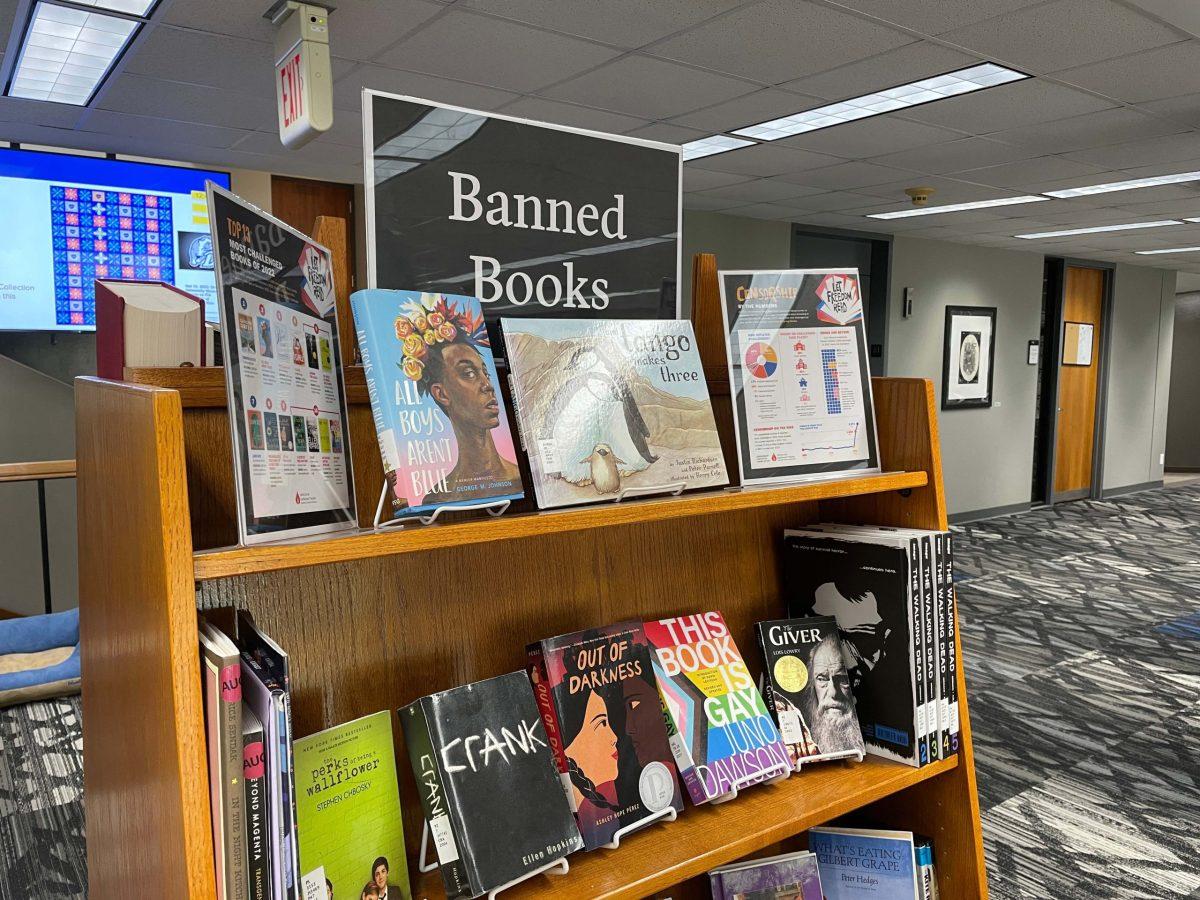Book banning has been heavy on the minds of Urbandale residents since school let out for the summer. This July, while the halls stood empty, the library shelves were emptied too.
On Aug. 3, 2023, the Urbandale Community School District released a list of nearly 400 books to be removed from shelves, effective immediately. This decision received instant backlash from parents and community members who viewed the ban as a form of discriminatory legislation.
“The department of education isn’t doing its job,” said Sara Hayden Parris, the director of the Johnston-based nonprofit Annie’s Foundation, which distributes banned books to community members free of charge.
On Wednesday, Oct. 4, Hayden Parris attended the Let Freedom Read panel hosted by Drake University. This event was part of a larger, nationwide event called Banned Books Week, an annual event meant to raise awareness about prior and current attempts to ban books and celebrate the freedom to read, according to the American Library Association.
The panel was moderated by Gillian Gremmels, the dean of Cowles Library. Panelists included Hayden Parris; Sam Helmick, the chair of the Iowa Library Association’s Intellectual Freedom Committee; and Jason Menke, a Drake graduate and current member of the Urbandale School Board. The faculty respondents to the panel were Beth Younger, DeDe Small and Teri Koch.
“Education policy will not change until we have a legislature that recognizes that our public systems need to represent every Iowan,” Menke said about the importance of conversations about banned books. “We need to have people who will advocate for public education and libraries on school boards.”
Through this panel, staff and panelists hoped to both inform community members about the dangers of book banning and facilitate conversations about book banning in a safe, moderated environment. Helmick began by thanking audience members for being “in community” with them that night, no matter what opinion they held on the matter.
As the chair of the Iowa Library Association Intellectual Freedom Committee (ILA), an organization that fights for Iowans’ right to read, Helmick has long been familiar with the world of attempted book banning.
“Some of the folks who are doing this work have sent me letters demanding that ILA remove its affiliation from the American Library Association despite the fact that Iowans wrote the Library Bill of Rights,” Helmick said after the panel. According to Helmick, the ILA receives letters like this frequently, along with other letters targeting Helmick themself.
According to Younger, book banning furthers issues of representation and inclusivity.
“I think [book banning] is really insidious and offensive. To me, it’s just an aspect of trying to erase or harm people. It’s not just about the book, it’s about representation,” Younger said.
Book banning has made an appearance in recent Iowa state legislation. House File 802 and Senate File 496 are both bills that have been brought to the Iowa State House and Senate within the last year. Helmick says that the bills directly affect Iowans’ freedom to read.
Back in May, Iowa Gov. Kim Reynolds signed SF 496 into law. Some Iowans took issue with this, noting that the bill was designed to remove books exhibiting explicit content from classrooms but excluded religious texts containing the same content from that request.
SF 496 officially says that educational programs “shall be taught from an age-appropriate, multicultural and gender-fair approach,” but this clause is more or less discretionary.
A few pages down, the bill continues by saying “for the purposes of this section: Age-appropriate means topics, messages and teaching methods suitable to particular ages…based on developing cognitive, emotional and behavioral capacity typical for the age. ‘Age-appropriate’ does not include any material with descriptions or visual depictions of a sex act.”
This description is just vague enough for injustice to slip through the cracks, according to Hayden Parris.
“I don’t know how it’s confusing to people,” Hayden Parris said. “[Legislators] have said the ‘why’ part out loud…the intent of the K-6 portion of the bill is to [keep] mentions of LGBTQ people out of elementary schools.”
Schools have become a battleground for book banning in recent years, but according to the panelists, the domain will not remain there. Currently, librarians and educators are the ones being tasked with fighting for Iowan children’s right to read, but Menke believes that this should not be their responsibility.
“We have to demand leadership from the places that are legally obligated to provide it, and that is the Iowa Department of Education,” Menke said. “We do not have leadership currently. We have an environment that creates uncertainty and fear, and that is absolutely no place for public educators or librarians to be operating from.”
In addition to organizing the panel at Drake University, the library wanted to emphasize access this Banned Books Week.
“We are showcasing the most challenged books by book-banners,” said Deana Cunningham, an Access Services Librarian at Drake. “The library is all about creating access, no matter what someone’s viewpoint is. We will never try to ban a book. We will never allow that to happen.”
The panelists encouraged students to get involved in any way they can, whether at home, in the community or at their schools.
“I invite you all to reach out to [ILA], to come to the Capitol when there are library adverse bills…to share your voice,” Helmick said. “We invite you into the fold. Come and speak for libraries because your voice matters.”








